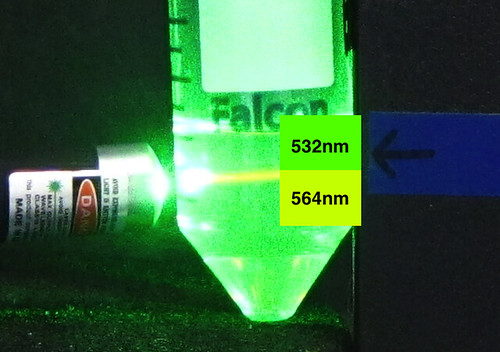Following up on my experiment with a green laser and olive oil, today I tried to make a more rigorous and repeatable setup and actually measure the reddish fluorescence with a PLOTS spectrometer. I wasn't really successful -- I need to use glass test tubes instead of plastic ones (they scatter the light far too much) and I'm not sure the light is bright enough for our instrument. I'll keep trying; maybe somehow blocking the green light inside the spectrometer would allow it to overexpose enough to get the red light.
Still, it was cool to get such an exact measurement of 532 nanometers for the green light!
Update: It's possible the tiny spike at 564 nanometers in the olive oil sample is fluorescence. It did not show up in the control. I checked the colors of each peak using this wavelength to hexadecimal color calculator and did a visual comparison to the photograph I took here, and it actually seems pretty close!
It's different from what I had described as a "reddish" color, but I wonder if my perception of the color was "colored" by its contrast to the powerful green?
Also take a look at this neat separation of red, green and blue I did in Photoshop:



10 Comments
Cool experiment, I have some glass test tubes if you want to give them a try?
Is this a question? Click here to post it to the Questions page.
Reply to this comment...
Log in to comment
OK, this guy is doing it with a $7,000 Ocean Optics Jaz spectrometer and several lasers: https://www.flickr.com/photos/bob_81667/6811951183/in/set-72157624831829718/
We should try to match his results!
And:
http://www.vernier.com/innovate/determination-of-chlorophyll-in-olive-oil/
Is this a question? Click here to post it to the Questions page.
Reply to this comment...
Log in to comment
You don't need a JAZ or lasers to see chlorophyll's fluorescence. LED's and a simple spectrometer can show it:
Here's a pic with one of Bob's spectra: https://www.flickr.com/photos/28617364@N04/6789117133/
Here's a pic of a spectrum taken with a $20 spectroscope. https://www.flickr.com/photos/28617364@N04/6831968677/
More pics of the experiments. https://www.flickr.com/photos/28617364@N04/sets/72157629930307517/
Reply to this comment...
Log in to comment
cool - well we're using webcams in our spectrometers, but the spectroscope you mention is paired with a camera that's taking a long exposure, right? It's harder to extract data automatically from a still camera, but the ability to do a long exposure is a big plus. My main problem at this point is that the amount of fluorescent light generated by the laser is not a lot for the small webcams we're using.
Typically we've been using halogen, tungsten, or other full-spectrum lights:
http://publiclaboratory.org/notes/spectrometer
but it's much easier to separate the signal from the source light with a laser, so I was interested to try.
Personally i'm not trying to measure chlorophyll but just doing tests and eventually trying to detect polyaromatic hydrocarbons (PAHs) from oil spill contamination. So this is kind of a stepping stone, but it was neat to see some high-end data to compare to.
Thanks!
Is this a question? Click here to post it to the Questions page.
Reply to this comment...
Log in to comment
It looks like you need a little rectangular glass container for the olive oil, like a tiny aquarium. Then the laser can shine right along the inside of the glass and all the oil along the glass will fluoresce. Then use a slit aligned with the laser beam so only the fluorescing oil can be seen. Align that slit with the spectrometer slit and only light from the fluorescence will enter the spectrometer. A longer exposure sure would be helpful.
Reply to this comment...
Log in to comment
($20 each) http://www.opticsplanet.net/unico-glass-square-spectrophotometer-cuvette-10mm-pathlength-3-5ml-capacity-vis-only.html
or for fancy people who want extremely good mid-infrared transparency: ($171 each) http://www.opticsplanet.net/unico-square-cuvettes-quartz-2x2-5-mm-window-s-90-359q.html
Bob seems to have used glass jam jars or tumblers. I think i'll raid the supermarket before spending on "real" lab equipment.
Reply to this comment...
Log in to comment
Here's a much much nicer spectrum in "a little rectangular glass container" just as Chris suggested. I still can't get a strong enough light that the spectrometer detects it. I'll keep trying. Also looking for a sample of heavier oil, like motor oil, to test. Then i'll try some samples from the Gulf oil spill!
Reply to this comment...
Log in to comment
following
Reply to this comment...
Log in to comment
need a source for those little jars. somewhere
Reply to this comment...
Log in to comment
I got them at American Science and Surplus: http://sciplus.com/p/WHITCAP-BOTTLE_48212
But now we're thinking of this bulk buy of cuvettes, that may be a good standard for everyone to adopt. Let's try to move forward on that.
Would you be able to add a section on sample containers on the spectral analysis wiki page?
Is this a question? Click here to post it to the Questions page.
Reply to this comment...
Log in to comment
Login to comment.